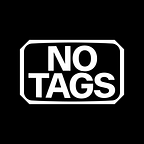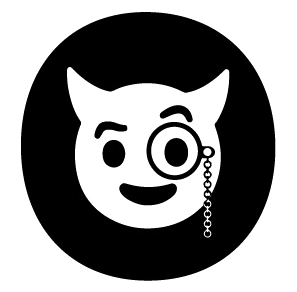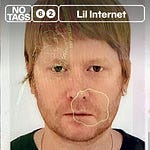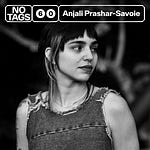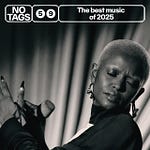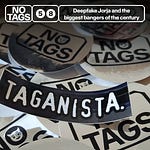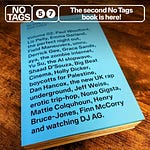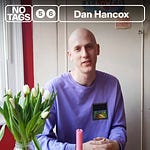We’re back after a choppy few weeks of moving house, hosting talks, launching books and other unavoidable life admin – but it’s time to put the Taganistas first again.
Booting off a busy season of No Tags content, we’ve got an interview with professional music fan Derrick Gee. You’ve likely come across Derrick on your feeds already. He’s a beacon of sophistication in the murky waters of social video, and a true enthusiast for everything from audiophile sound systems to viral TikTok trends to his favourite bossa nova recordings.
He’s racked up millions of views, toured Japan and America, lured huge names onto his YouTube show – and done it all by focusing almost exclusively on music outside the mainstream.
So is he a music journo? A critic? A content creator? Derrick dialled in from Sydney to talk to us about his curious content niche and how he earns a living from loving music.
Also in this episode: the spontaneous launch of a new segment we’re calling Never Has Nobody Ever. This baby’s gonna run and run.
Housekeeping: Come see us live in Sheffield! The second pressing of the No Tags book is down to the last 50 copies! Chal’s written an essay for a new photo book from Sports Banger and K2 Plant Hire! Drop us a like and a review on Apple and Spotify so we can show the RA Exchange who’s boss! And as ever, if you continue to get a kick of what we’re doing here on No Tags, consider throwing us a fiver a month – or spread the gospel to your friends.
CR: Hi Derrick. I thought a good place to start would simply be to ask: what you have been doing in the last week or so? What did you most recently post?
DG: Great question. That’s probably a more accurate way to explain to people what I do than just say ‘content creation’, ‘music journalism’, all that. It’s been a funny week to be honest. I have been speaking with potential agents for a live portion of what I do. I have shot a bunch of videos. One I shot and edited over the weekend talking about a K-pop song that referenced trance and breakbeat, which I had a gut feeling would do well, and I think has just hit a million views. I kind of have a gut feel around what videos will resonate in a meaningful way. I shot another couple of videos, one about the state of rap and the kind of dystopian lens that it is going through which I don’t really want to edit because that is going to take a while.
Five minutes ago I was texting about a brand partnership, an email that came through at 5:46pm on a Friday about ‘can I do this shoot on another side of the planet, and what would the cost be?’ Which is stressful and exciting. Yesterday I had lunch with a record label talking about who is in town from the label. And then I went straight to a glasses fitting because there was a company who wanted to give me free glasses.
CR: Wow.
DG: Yeah, it is silly. It is all a bit of a mess, my week. It goes from, you know, very admin and very business to wafting around deciding what percentage of grey tint I should get on my next pair of free glasses.
TL: How do you handle this stuff? I’m forever trying to regiment my working life into some sort of schedule or structure and constantly losing control of it. It’s always a push and pull. Are you pretty good at handling it all at this point, or are you still basically controlling chaos?
DG: No, I love it. I like variety. I like solving problems. I added a fifth monitor into my office today for another view of another camera, but I also like very serious business meetings. I know that sounds silly, but I enjoy that aspect. And maybe that is why I found some success, because I like the strategic thinking that I have to do around how the brand is being built. I like thinking about what is next. Where can I take it? And then I like going on a live stream and playing games and reacting to people's silly comments. These are all aspects of me that I’ve learned to be proud of, I guess. Because if you think about it, I’m on a call negotiating something and then I jump on Twitch doing something silly and talking to a bunch of strangers… it is bizarre. But it’s still the same person.
TL: I sometimes think there’s a bit of a British thing, or growing up in Britain at least, that you have to unlearn – this ‘jack of all trades, master of none’ attitude. If you try and set the range of what you’re doing too wide or varied, you get shut down for that. I’ve always found that’s something I’ve had to unlearn.
CR: What, no one is letting you be the renaissance man that you truly are?
TL: I wouldn’t put it that way, but I do feel that there’s something you have to push through. I think we’re conditioned over here to put quite strict parameters on what we do, rather than just be like ‘oh, I can do this and that, and these are all parts of me, and that is totally natural and fine’.
DG: Well, I lived in London. I lived in New York, and I’m Chinese-Australian. Culturally, I think that probably impacts my personality in other ways too, but I do agree. In Australia, I think the sense is like: do not be too proud, do not be too ambitious, talk yourself down. When I worked in London, it was: do not show off too much, do not be too flashy, do not be all, ‘yeah, we are killing it, we are crushing it, this is the best thing, we are going to make something great’. It’s like, no, be humble about it. And yeah, it was specialised. You do that thing, and that is what you are known for.
And then when I worked in New York, it was like, ‘we are the best, everything that we do is going to be incredible, and we can do anything and everything that you want’. And I personally needed all of those aspects, but I especially needed the American one, because there is an expectation around excellence there. You are going to say it is excellent, and then it will be excellent. Some of it is sales-y and lies, but I think because I resonated more with a London aesthetic, being an NTS Radio host in the past and everything that comes with that, I needed to be like, ‘yeah, I can do something great, and I stand by it, and I am proud of it, and you should work with me’. So I completely agree.
TL: This is why Americans are better at asking for pay rises. So you refer to yourself as a professional music fan. Was there a point where you specifically decided that you were a fan and not a critic? Is that a deliberate dividing line that you’ve created there?
DG: For sure. I guess on the internet, it’s mostly criticism. I mentally tried it on, I have a lot of opinions, as we all do. And I like a lot of stuff and dislike a lot of stuff, but it’s just not in my character. I think that’s the answer. If you like something that I dislike, I’m not going to make fun of it or tear you down for it. And I’ve learned that people really like that I’m enthusiastic and share things.
There are stadiums sold around music that I can never understand, and that does not mean I am right about it if I dislike it, it just means it’s not for me. So I think the fan word in that is really important to me because I just get excited by music I love and I try to get other people to be excited as well.
CR: I wanted to talk to you about AI-generated music. On one of your videos you stumble across a ‘lo-fi jazzy’ mix on YouTube and work out that it appears to be AI-generated. And there was another of your videos about AI-generated records designed to look like amazing long-lost reissues from Japan or the Middle East, with vintage-looking sleeves.
You made the suggestion that if AI music was clearly labelled then it could maybe be appreciated properly and we might be able to deal with it differently. What do you think would be the route towards an actual appreciation of AI-made music? Can that happen?
DG: I guess it is happening already, but we probably do not know that we are appreciating it. I think it has to happen. You know, I don’t always want to be the eternal optimist. I think it is very grim as well, but I think it is unavoidable. It’s like The Brutalist, AI is just in things [in the film The Brutalist, some of Adrian Brody’s Hungarian pronunciation was tweaked via AI to make it more accurate]. It is already in everything. To what level it is disclosed is still grey, and I don’t think you can be perfect with it. It’s like ghost writers or whatever, you cannot catch it all.
But I think it is a medium. It is an instrument in a sense, like any other. And I think that when there is a lot of pushback on new things, generally that means it is interesting, it is exciting, and someone is going to do something really cool with it. So I am really open and excited by what can be made with it, and I am totally open to there being an AI-generated, completely new artist that makes great music. I think that that is dark, but I think if it is designed by someone and, I guess, prompted in the right way, it could produce something that we have never thought about before. But I think disclosures are crucial on the internet, as protections for our own mental health, sanity and protection of art. I do not think it should be generated on its own and just put out there. Do you guys have different thoughts?
CR: What your video made clear to me was that there seems like a difference between a lo-fi jazz mix on YouTube – where it’s not really breaking any kind of musical boundaries, it’s obviously designed to be background listening – and these other records that are made to look as if people from a particular time and context made them. Let alone the orientalist worldview – you know, “Funky Habibi” or whatever one of them was called. But I care about music because of the people who make the music, right? And I am interested in who makes the music, and I want to talk to them about why they make music. That is why I do my job.
DG: Well, artist identities are often fictionalised, right? The personas that they put on can be an art form in and of themselves. So many artists that we have loved have completely fictional backstories. We do not know anything about them. And so I like being challenged, I think, because of what I do. I come up against my own hatred and disdain for change because I like what I grew up on, just like anyone else. It’s still so crude right now. But I think that there is going to be someone out there who creates a story and creates a world that we all get wrapped up in.
CR: A very different video which I feel will resonate with listeners of this podcast is where you go to test out three speaker stacks against each other. There’s a Funktion One, an MM Acoustic and a Void. Obviously I hear a lot of Funktion Ones in the club. That’s really standard in London. I was curious, how different were they really? Which one did you like the most?
DG: So different. They were so different. With the caveat that there are a bunch of different variables: what was the source? What was the amplifier? Was it tuned for the room? All this silly stuff. In essence, the Funktion Ones sounded – I am not going to say objectively – the worst of the three. But they sounded the warmest, and were the ones that you could listen to the longest.
The MM Acoustics had the balance of clarity, warmth, punch, detail, all that sort of stuff. And the Void ones were intense. There was so much range to it, so much that it was almost like, I can not listen to this for too long because my ears will start to fizz. So to use a Goldilocks kind of comparison, the middle one, the MM Acoustics, were the best. But if I was at an all-day rave… that is why Funktion Ones are probably the ones that people always go for because they might not be audiophile-detailed, but you can stand next to it for 10 hours and be all right.
TL: Do you have a go-to record to play if you are testing speakers?
DG: I think I’m looking for variation. I will put on jazz, I will put on house, I will put on trap and then go, OK, how did they all perform? I’ll play ‘How Low’ by Ludacris because it’s got really, really low sub bass. And I just want to know if it can get down to that point. If you play some John Coltrane, I want to know if you can hear the drum sticks being held. So it is more about the familiarity of the songs. And then sometimes you just throw on a curveball like a Radiohead track to just see how it does. And sometimes that represents how well the song was recorded, but sometimes it can really surprise you. So for me it’s more like just bring a mixed bag and see how it performs. And sometimes you just know, OK, this speaker does better with that genre.
CR: One of my favourite videos of yours was one where you asked which movie psycho has the most psychotic audiophile setup, which is an inspired video concept. You’ve got Alex from A Clockwork Orange, Patrick Bateman – they all have these crazy hi-fi setups. Why is it psychotic to love high-fidelity audio?
DG: Yeah, it’s kind of like incels before the word incel, right? I think if you like audio generally, it means you don’t like music, and you don’t have a soul because you just like the technical idea of emotional experience. I have never ever on my channels ever called myself an audiophile. I do not think I am one.
CR: You’re audio-curious.
DG: Yeah, I’m interested in the full experience of music, from how it is written, to how it is recorded, to how it is expressed, to how it is heard and listened to. And I think I like to learn what makes it different, what makes the experience different.
With that video, I was watching Tár, and she had an insane pair of speakers – like insane. And I was like, why? Why do they all have to have this? And it is representative because with a lot of audiophiles that I have met, it is so technical, and they want to know ohms and wattages and cables and what files you are using and all that sort of stuff. I do not care. I listen to music on anything, and if I can listen to it on a nice thing, I will.
But I like to learn, and I have met people that have allowed me to learn more. So I will go to a really expensive hi-fi store and just ask them, can I listen? Not many people would feel comfortable doing that or be allowed to do that because they do not feel like it is their place. But I get to listen to a million-dollar sound system and put on my favourite songs and compare them and think about it and go, oh, this is why it is good, this is why it is bad, and all that sort of stuff, and not own it. More like a kid in a candy store.
CR: I wanted to ask about your approach to YouTube. Looking at your channel, you’ve got radio show-style interviews with a big guest, like when Jamie xx or Max Richter come to visit. You have got vlogs, behind-the-scenes filming when you’re out and about. You have got your classic straight-to-camera videos where you’re talking about an idea or a song, and they can be really long. And then you’ve got the Instagram videos and reels, which are obviously more bite-sized. There are quite a lot of different ideas.
DG: I just like to experiment. I studied design at university, so I’ve been quote-unquote-creative in some sense my whole life. And my last job before doing this was a creative director in the music industry, so I like ideas, I like building things, new formats and brands.
So I think there are two answers. One is that I like experimenting. I like challenging myself. I like doing things I have not seen before. I like surprising people. But I also like showing that I am a three-dimensional human being. And I think that is a small portion of why my thing is working, because I think people know that I have interests and I have a sense of humour about myself. Like the headphone thing, it’s just part of an interest, you know? I almost don’t care how the numbers perform as long as I can put stuff out that I am excited by. And I think the more I do it, the more I follow that instinct. If I am excited, then other people will be excited. If I am trying to do the same format over and over and over again, then I am going to fall out of love with it. If I’m trying to find a sample and then put you onto that sample and then do that every single video because that is the format, well, then it’s kind of soulless, and we see that all over the internet.
I feel like people feel that they know me. When I meet people, they feel like they have a sense of who I am and feel like they can hang out with me. And not in a para-social way, but I do want that. There are so many fake characters online that I want people to meet me and go ‘he is exactly the same’.
CR: And do they say that?
DG: They do, actually. It’s very rare that they catch me in a moment where I am not the same, except for like if I’m with my family and not wanting to be bothered. But I am very grateful if anyone says hello. So I hope and like to think I am the same person.
CR: Who are your followers in real life?
DG: Really nice people, I think. All ages. Sometimes they are parents that bring their kids [to my live events]. Sometimes they are kind of me at 19, not loners but music nerds that did not have anyone else to talk to about it. Sometimes they are couples. I think the funny thing is because I make videos about a raft of different things, they often come to me for different things. So they might be like ‘you talked about this K-pop thing and I watch you for that’, or it might be ‘what headphones are you wearing?’ And other people are like, ‘I really liked that breakdown of Budots in the Philippines’. That is really nice. I am proud of that, that they come to me for differing reasons. But they are lovely. They are not judgmental, and I think they are really supportive of one another when I have events. When I had a stage show, I asked the crowd questions, and everyone was really open-minded. Everyone respected each other's opinions, and I hope to continue to nurture that.
TL: You obviously have some videos that are astronomically popular, but a lot of the music you are covering is miles from the mainstream. It could be classical, it could be jazz, it could be bossa nova, it could be Budots. In many of these cases, you must be the only person with a popular TikTok account covering this stuff. Is that the case, or am I just missing an entire world of classical criticism online?
DG: There are pockets of people for sure. I would never say that I’m the only one. But I think where I do recognise where I am unique is my range – that I can confidently speak about a lot of subcultures with depth. It can feel like both a compliment and an insult when people say, ‘oh, what you do is so niche.’ because it’s like, have you seen how many followers I have? [Laughter] But it is. It is niche. But I think it’s an accessible niche.
CR: The irony of being niche though, and being interested in supposedly niche or marginal music, is that it is actually the broadest range of music and requires the broadest knowledge to make sense of it – compared to having a channel which is all about Chappell Roan or something. There’s loads to get into with Chappell Roan of course, she is a proper artist with ideas that you could explore, and there will be lore that is building. But in a way, what’s niche is to be in a very small pop music range. What you’re covering is vast, you know, it is global and historical.
DG: No, definitely. I grew up on the internet and I have internet friends from all over the world, so it’s all fair game. And I like learning about different cultures. I get excited by that sort of stuff. And I do think a lot about when I was young and there were radio hosts that put me onto that stuff. I did think early on, well, why can’t I be that for that young person that is hungry to learn? And I can be a gateway. I do choose to steer clear of the Kendrick Super Bowl performances and the Chappell Roans of the world. It’s interesting, I’m aware of it, I listen to it, but you do not need to get that from me.
TL: In my own experience, when I was a music journalist, that side of it was one of the things that burnt me out – feeling like you needed to quickly have an opinion on the new Kendrick or whatever. And when I quit – obviously I’ve now been pulled back into it by this podcast, I suppose – but when I quit the first time around, it was like, ‘oh, I can listen to a new Beyoncé record now with no pressure to feel like I need to have an opinion on it.’ That was the side I found the most draining towards the end.
DG: I think that is where the toxicity of lots of internet music journalists comes from. They have to have a take on everything, and so it dilutes their credibility and their taste. I have listened to [latest Kendrick Lamar album] GNX once. Life is long, I will get around to it. There is so much interesting stuff out there. Why do I have to race to have an opinion on it? And that can be the slippery slope of the internet where you have a billion videos breaking down the triple entendres in Kendrick Lamar videos. It kind of takes away from the enjoyment of the music and makes me not want to listen to it. So maybe that’s why I’m more like: listen to this thing over here that is far more interesting and will inspire you, and no one is telling you about.
TL: How quickly were you able to turn this into a day job? For context, you were working in the industry for a long time before this, and then you started the videos… around three years ago?
DG: February 2022. My son was born in March 2022. So a little marker.
TL: Sure, it wasn’t like you were going to be busy any time soon. No seismic changes on the horizon in your life.
DG: I swear [having a baby] somehow just gives you more energy, it makes you a bit crazier in a sense. But there was a lot of risk. I saw the momentum of it. I saw the potential of it, but it was like, am I really going to put all my eggs in this basket? Financially I went backwards for a second because I probably made the leap a little too soon. But you have to make those mistakes.
It’s also: what do you stand for, and where does your money come from? I’ve done brand deals that I am proud of, and they are beautiful. But I’ve also done brand deals where I thought, ‘oh, I probably shouldn't have done that’. I have said no to things I regret. So it’s really difficult, I would say. Not like the job is difficult, but it’s really difficult to grow something that’s based on your passion and then maintain its credibility while trying to earn a decent income. And I talk about, hey, I get free glasses, and the amp is free, and all that sort of stuff. But what is the exchange within that?
CR: You also cannot eat free glasses. You can have a room full of speakers, but there has to be real money at some point, doesn't there?
DG: Exactly. And transparently, I get offered every day a free trip or ticket somewhere for a press trip. And I now blanket don’t do that – I’ve put it on my ethics statement, I do not do that. If I take a week to go somewhere and film some content, I would love to do that, but then I am not earning any money. I think the lens is still very much, ‘congratulations influencer, we are going to fly you somewhere!’ But I know that’s going to wipe me out, and I will probably suffer for that. So I had to make that very clear and build boundaries around it.
TL: Can I just go back to this ethics statement? This feels like a topic that people are talking about a lot, especially off the back of this new book Selling the Night which recently came out. So first, I’d love to know what this ethics statement says. But on a broader level, where do you draw the line with brand partnerships?
DG: So the ethics statement came about I guess because I am a bit of a nerd, and the tech YouTubers that I admire have them. They say: I do not get taken on trips, I am not gifted anything, I get loaned it or I buy it myself. I really respect that. I have been watching those content creators for 15 years or more. And then when it came to my own ethics, very quickly [I was getting requests like] ‘Hi, can you talk about this song for this much money?’ You have to make a choice. Every music content creator has to make a choice what road they go down.
TL: So you have been offered outright payola?
DG: Yeah, ‘we are going to pay you to cover this song’. It is rife. The majority of music recommendations on the internet are paid for. Straight up. I don’t call them out because it is people’s livelihoods. I don’t like that people do it, but I don’t like taking money away from people. But it is pretty ugly, and it is mostly payola. And it is fascinating because I see all the emails, I see all the artists, I see what they are offering and what they want you to do for it.
TL: And then I guess you see that music covered on other channels, and you’re like, ‘I have seen the email. I know the rate!’
DG: Yeah, because there’s no hard law. You do not see ‘paid partnership’ on any music thing. So it could just be like, ‘I am vibing out to a song, and it is by X’. I thought about it for a second and maybe it was an easy decision because the pay was so low. If it was good money, maybe I would have thought about it harder, but it was like, are you kidding me? You are buying me for that little? So I just went, like, I need to write this down, and I need to put it somewhere. People email me about playlisting and adding their music to my playlists and stuff, but I do not do that.
What I say yes and no to in terms of brands, it is about, well, do they like what I do? Have they seen it? Do they respect it? There was one where it was like, ‘could you, for a good amount of money, play Japanese records at a Japanese restaurant for a Japanese whiskey brand?’ I’m Chinese for starters. [Laughter]
But I asked my friends about the restaurant. They said it was pretty corny. I do not drink whiskey. I obviously like Japanese music, but I was like, this is too far. So I said no to that. But generally, the more I do this, the more I find that when I have lots of calls with people, and find out if they really support what I do and trust what I do, that’s when it works out.
CR: We are obviously forced to use huge tech platforms in order to talk about music, share music and distribute music. We [No Tags] are on Substack. You are on YouTube, Instagram, TikTok. There’s not an obvious way to avoid that. I was curious if you have any thoughts about how we – and I guess by that I just mean people who are somewhat DIY, talking about music that is non-mainstream – can use those platforms best in order to benefit that alternative culturt, or even subvert those platforms in any way? Is it something you’ve thought about in terms of having to use YouTube and Instagram in order to do your work?
DG: To make a living, or to spread the stories and messages and journalism?
CR: I suppose a bit of both. Just a sense of being able to have some feeling of control over it, ideally perhaps subvert it in some way, but even just to use it in a way that feels beneficial to people and culture, right? Because ultimately the way that these platforms work is that you are the product. Your data is the crucial thing. How do you think about making use of those platforms in a way where you’re not simply adding to the giant pile of cash that Google has?
DG: I think my answer to that would be that I am fearful about all of them going away, so I’ve built a position where I am diversified. But more to the point, I think how one builds and protects and propagates ideas is through… I hate the word fierce, but being fiercely yourself. The only way to protect yourself is by being you and not trying to be anyone else for any platform. Why has my stuff worked on every platform that I go to? It’s not because I am necessarily good at a particular one, but because I am quite aggressive on representing myself. My Instagram stories can be silly. I can do quizzes on there. I can do a variety of different things. And I think less than using them to your advantage, it is more like, are you contributing something that is original? And that propagates itself wherever you are, I think.
I still work in advising artists on social media strategy. And I think there is too much thought around algorithms and best practices and how much you should post. [Succeeding on these platforms] is about expression, and it is about truth. It sounds wishy-washy, but when I did write Substacks, I would just kind of write into it. I would do a few rereads, but I didn’t edit it too much before sending it out. And I think that was quite pure. It wasn’t formatted in a particular way. It wasn’t branded in a particular way. It was just how I felt. I took it seriously. I wrote it seriously. I never want to provide junk anywhere. I do always think: is there some sort of value to anyone and entertainment to anyone? I think as long as you can express yourself in a way that is contributing to that, then I think you are protected from anything. As long as I am me, it seems to be all right.
TL: I don’t think it’s hard to see when someone is forcing something, or trying to put across something that doesn’t come naturally to them. You see this all the time where DJs are complaining about social media: ‘This isn't my job, this shouldn't be my job, I have to do this.’ I understand that, but at the same time, half the issue is that you are scrambling for a selfie to promote a gig that you don’t want to talk about. And I do think it’s possible to use these platforms for something a bit more fun and authentic, and then it starts to feel like less of a job, right?
DG: Yeah. I think, unfortunately, those kind of artists get left behind. I think that the mindset is a bit too pessimistic. The way I think about it is that you don’t have to play in dive bars to nobody anymore because you can… not jump the queue, but by putting yourself out there, you can not have to do all the other shitty things that you used to have to. I’m not saying anyone needs to make content or do anything, but the opportunity is there. I have a fan base around the world from my apartment in Sydney. It is silly. It does not make sense, but now I can jump out of a cab in most places, and someone will go, ‘hey, I know you’. And isn't that an incredible development in terms of music and culture and communications?
CR: You are a professional music fan. Obviously, a fan is a non-professional role by default. So how are you preserving the joy of being a fan and, you know, discovering things, not getting stuck in a rut?
DG: I started a radio show from my apartment in Sydney in 2012 because I loved listening to Gilles Peterson, and ever since I started that, it’s been hard to be a true music fan because you are always moving. As I’m sure you guys know, you are listening to the next thing, you are curating, and then you are deciding whether it is good or not. You are presenting it to the world and you are moving on. So I consume a lot of music, I have an opinion about a lot of music, but I also do not have a great memory for a lot of music because I am always moving to the next thing. So I do think that my connection to music is shallower in a sense, but it is an age thing as well. I think as you get older, those ‘this album changed my life’ moments get rarer.
TL: And you have less time as well.
DG: Yeah, that too. So that is an unenjoyable part to it. But I think how I maintain it is I do a show every week, every Friday on my Patreon. So that keeps me keen. I like diving into new subcultures that I do not know much about to keep me fresh. That’s why you often see me sharing things from around the world, because I am trying to continue to understand places that I do not normally have access to. And sometimes I ask my community to put me onto things so I can learn about them. I think that’s really healthy. When I had to learn about K-pop for a job that I had, it helped me develop a palette or an understanding for a culture and a world, and it expanded my world tremendously. And that only helps me as a music fan. So I am very grateful for that experience. And I’m keen to find that next thing, whether it’s Filipino pop or Indonesian psych or whatever, that I get excited by.
TL: Our last question is always the same. Recommend us and our listeners a film!
DG: Happy Hour, a Japanese film by Ryūsuke Hamaguchi. It’s over five hours long. It’s one of those films that only continues to ascend my list of favourite films of all time, and I’ve only seen it once. You know that feeling where you enjoyed a film at the time, but then you keep thinking about it? And now I think it might be one of my favourite films.
It’s about four women in their 40s. One is breaking up, one is trying to get away from things, one has got a funny relationship. And it is tremendously boring and pedestrian and wonderful because it feels like you’re watching them like change emotionally while not much is happening. There are some scenes that go on for way too long. There’s a book reading that is happening in real time – like OK, we are doing the whole reading here. The full 40-minute session. But it’s everything about why they are there, how they are sitting, and who comes in and who they are looking at. I like slice-of-life films where you walk away having a lot more empathy for people's experiences in different walks of life, and how they process it and why they process it and how they make decisions and why people stay doing the things they do. That’s my recommendation if you’ve got 317 minutes to spare.


